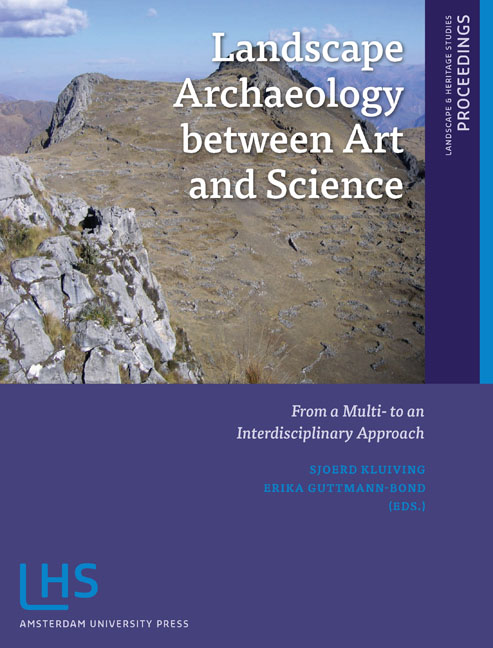Book contents
- Frontmatter
- Contents
- Preface
- Introduction: LAC2010: First International Landscape Archaeology Conference
- THEME 1 HOW DID LANDSCAPE CHANGE?
- THEME II IMPROVING TEMPORAL, CHRONOLOGICAL AND TRANSFORMATIONAL FRAMEWORKS
- THEME III LINKING LANDSCAPES OF LOWLANDS TO MOUNTAINOUS AREAS
- THEME IV APPLYING CONCEPTS OF SCALE
- THEME V NEW DIRECTIONS IN DIGITAL PROSPECTION AND MODELLING TECHNIQUES
- THEME VI HOW WILL LANDSCAPE ARCHAEOLOGY DEVELOP IN THE FUTURE?
- Miscellaneous Endmatter
2.1 - Pre-industrial Charcoal Production in Southern Brandenburg and its Impact on the Environment
Published online by Cambridge University Press: 21 January 2021
- Frontmatter
- Contents
- Preface
- Introduction: LAC2010: First International Landscape Archaeology Conference
- THEME 1 HOW DID LANDSCAPE CHANGE?
- THEME II IMPROVING TEMPORAL, CHRONOLOGICAL AND TRANSFORMATIONAL FRAMEWORKS
- THEME III LINKING LANDSCAPES OF LOWLANDS TO MOUNTAINOUS AREAS
- THEME IV APPLYING CONCEPTS OF SCALE
- THEME V NEW DIRECTIONS IN DIGITAL PROSPECTION AND MODELLING TECHNIQUES
- THEME VI HOW WILL LANDSCAPE ARCHAEOLOGY DEVELOP IN THE FUTURE?
- Miscellaneous Endmatter
Summary
ABSTRACT
Due to modern lignite mining in southern Brandenburg and northern Saxony (East Germany), entire landscapes are being destroyed. In the area of the lignite extraction, the BLDAM (Brandenburgisches Landesamt für Denkmalpflege und Archäologisches Landesmuseum) concurrently carries out largescale archaeological surveys and excavations to study and document evidence of past land use by prehistoric and historic cultures. On the area of the Jänschwalder Heide (Lower Lusatia, southern Brandenburg) one of the largest archaeologically investigated charcoal production areas in Germany was discovered, demonstrating the great intensity of energy production in historical times. The charcoal was probably used in the nearby ironworks of Peitz, where bog iron ore was smelted since 1567. Meanwhile, remnants of more than 400 charcoal hearths are excavated. To charge those piles, large areas had to be cleared, which certainly had major consequences for the environment and the character of the landscape. At least for a while, the vegetation was completely absent on the deforested areas, which were used as farmland although the soils are very sandy and poor in nutrients. Wind-blown sediments covering the charcoal pile relicts prove that clearing and agricultural use has induced aeolian soil erosion and the remobilisation of Quaternary sands.
One of the main aims of the ongoing investigation is to build up a chronological framework of the former charcoal production. These findings have to be correlated with the major phases of the landscape dynamics, which are documented by the relicts of soil erosive landforms, human-induced aeolian sediments, and buried soils.
KEYWORDS
lignite mining, charcoal burning, Lower Lusatia, land-use history, anthropogenic impact
INTRODUCTION
Opencast lignite mining results in the total destruction of cultural landscapes and even small towns. Therefore, over the past years systematic archaeological research has been carried out in the opencast pits in Lower Lusatia (southern Brandenburg, Germany), prescribed by the regulations of the Brandenburgisches Denkmalschutzgesetz (BbgDschG). For the opencast pit Jänschwalde, it is expected that during the year 2010, an area of approximately 200 ha will be utilised (4 km length of the opencast pit and 500 m width of the excavated stripe). However, the large-scale impact of lignite extraction offers the opportunity for archaeologists to study landscape and settlement history as a whole instead of recording single findings and find spots.
- Type
- Chapter
- Information
- Landscape Archaeology between Art and ScienceFrom a Multi- to an Interdisciplinary Approach, pp. 167 - 178Publisher: Amsterdam University PressPrint publication year: 2012
- 5
- Cited by



